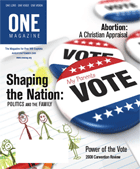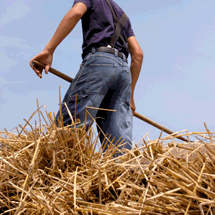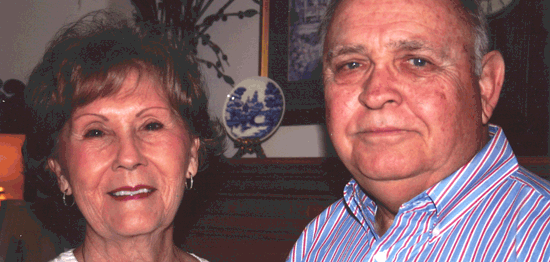
Shaping the Nation: Politics and the Family
|
 |
the generous entrepeneur
By Bill and Brenda Evans
To learn more about The Free Will Baptist Foundation, visit www.fwbgifts.org.
|
It is hot, hard, and monotonous. You sweat, itch, sting, and then you sweat some more. If you are paid just 20 cents an hour for shocking hay, the work seems even harder, especially if the man next to you is leaning on his pitchfork, smoking a hand-rolled cigarette, and getting paid three times as much.
At age 13, Howard Price and his cousin hired out to a neighbor but chafed all morning under the inequity of the labor and the fierce Virginia sun. At home for lunch, Howard complained to his father, “It’s not right.”
“I’ll tell you what’s right,” his father said. “You agreed to shock hay for 20 cents an hour, and so you go back and finish the day like you promised. And work as hard this afternoon as you did this morning. That’s what’s right!”
Entrepreneur Howard Price has learned many lessons in his 71 years, but his father’s instruction about being a man of your word started it all. By 1970, when Howard opened his first business, he had also learned from his father the importance of taking responsibility for your mistakes.
Although he was the youngest son of 12 children, Howard was never babied on the family’s dairy farm. When he chased his nephew with the tractor, ran into a ditch, broke the steering, and flipped the tractor, his father made him sell his prized 4-H hog to pay for repairs.
In addition to those childhood lessons, Howard gained wisdom from adult mentors and business partners. While finishing college at FWBBC in the 1960’s, he developed management skills at a rental store in Nashville. Through that learn-as-you-go training, Howard became adept in electronics, welding, carpentry, small engine repair, more management skills, and being able to spot a good deal. So in 1970, he and a successful Georgia businessman began a tool rental business.

Photo: Miriam and Howard Price
“When you don’t have a lot to give people, you beat your competition with service,” Howard says, “and that’s what I did.” In addition to learning that lesson during his first partnership, Howard committed all his resources, including both time and money, back into the business to make it grow. Three years later he bought out his partner.
Over the years, Howard has started and managed more than half a dozen businesses, from building and construction to auto parts and janitorial services, rentals for lawns, gardens, contractors, weddings, and parties. Among the principles he has learned is the concept of forming partnerships cautiously.
“One of my partners claimed to be a Christian, but didn’t live like one. He also was lazy. I’ve never considered myself just a businessman: I’m a steward. Everything I have belongs to the Lord, and I work for Him. So I dissolved that partnership.”
Among Howard’s philosophy of business and life in general is the view that “you don’t complain or talk about others. If you look hard enough, you find some good. And just as important is doing the job right the first time.”
“I find it difficult to be hard-nosed,” Howard confesses. “I’ve tried to teach and train my employees to tend to the little things, give good service, and keep records. Doing the small things may take only 20-30 seconds, but they make a big difference. Not all people learn that.”
Perhaps Howard’s most important lessons have come from business experience itself. When planning the three-section building that now houses two rental businesses, Howard decided to do it like he always had—himself.
“Before I designed and drew the plans for Arrow and Occasions, the only thing I’d ever built was a doghouse, but I thought I could do it. And I did, but I cost myself a lot of extra money because of it,” Howard says with a grin and a shrug.
Still, Howard holds that entrepreneurs have to believe they can do what needs to be done. “Sometimes you’re naïve and fly by the seat of your pants, but you have to have the will to find a way to do whatever you need to do.” Howard believes that sweat equity is a large part of what has made his ventures thrive: “The difference in me and my competitors has sometimes been that I’ve given a hard day’s work every day.”
In fact, Howard’s wife Miriam says that even in retirement, Howard still loves to work. “His mind is always going. He just got back from Virginia where he’s renovating a house that somebody else might say needed to be bulldozed down. But he’s made it really nice. Plus he’s doing it as a favor to help someone else.”
For several years now, Howard has not been involved in the day-to-day operation of his rental business. Instead, he buys, renovates, and turns houses into income properties. He has recently completed number 16. He says these properties have been among his best business ventures. One he had moved to a new location. After a complete overhaul, the house was appraised for more than twice his total investment, plus it brings in monthly income.
How does Howard know a good deal when he sees it? “Use common sense. Know whether the price is right. Check the neighborhood, the house next door. Ask yourself if you can do the work and if you are willing to. Do you have the money?”
Another lesson Howard has learned is how to deal with debt. “It’s not a sin to borrow money, but I don’t like personal debt. In business, I’ve had bad years and good years, but I’ve never been insolvent. I’ve always known that you can’t borrow your way out. Right now I have 16 rental properties, and all except two are paid for, and they soon will be.”
Howard also says from his years in business that you better live on what you make. “I’ve never taken equity out of my businesses to live a certain lifestyle. It’s done all the time, but I never have and never will do that.”
Above all, Howard focuses on stewardship rather than ownership. Miriam says of her husband, “He has a big heart. If renters don’t pay, he lets them stay and tries to help them work it out.” Howard sees that as part of his role as a steward over what God has given into his supervision.
Businessmen also have to plan for the future, Howard says. His role as steward has guided how his property and resources will be handled in his latter years and even after his death. In addition to the business and rental properties, Howard has invested in stock and mutual funds and has arranged a Unitrust at the Free Will Baptist Foundation.
“The Unitrust does what I want to do: gives us income now and goes to charity in the end. I’ve made arrangements for my children, but I’m not going to give everything to them.”
A long-time friend says of Howard, “When he sees a deal, he goes after it. And he knows the Foundation’s Unitrust is a good deal.”
Howard Price will finish life as he began. He will be big-hearted, a man of his word, and a steward of the Lord’s gifts to him. Miriam says with a smile: “If Howard dies before me, I’ll lay his hammer and saw beside him because he will never quit.” And perhaps that is the final lesson from this generous entrepreneur.
About the Writers: Bill Evans, former director of the Free Will Baptist Foundation, lives in Nashville, TN, with his wife Brenda, a retired English teacher. They are proud grandparents of six. To learn more about unitrusts and other planned-giving options offered by the Free Will Baptist Foundation, visit www.FWBgifts.org.
|
|

